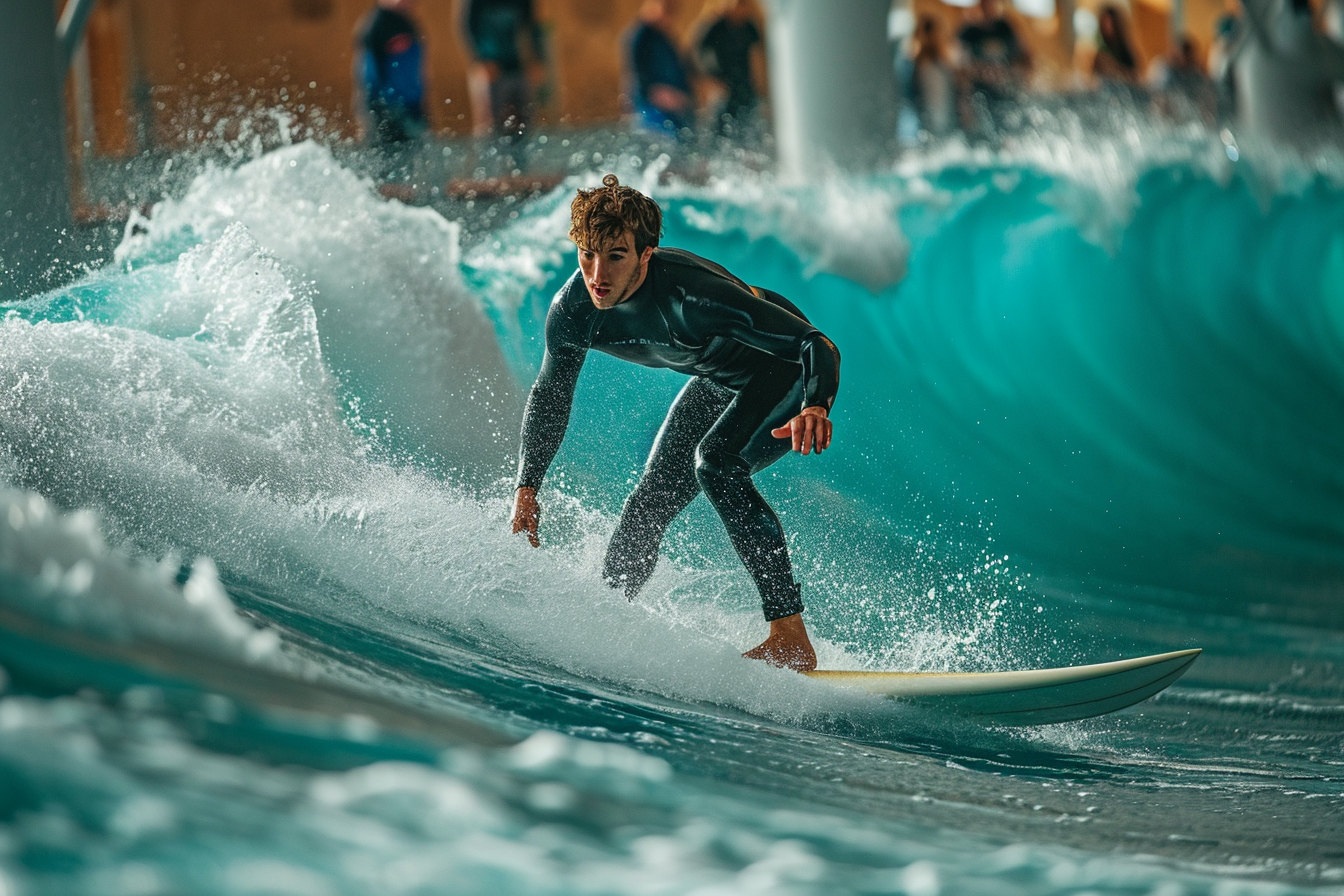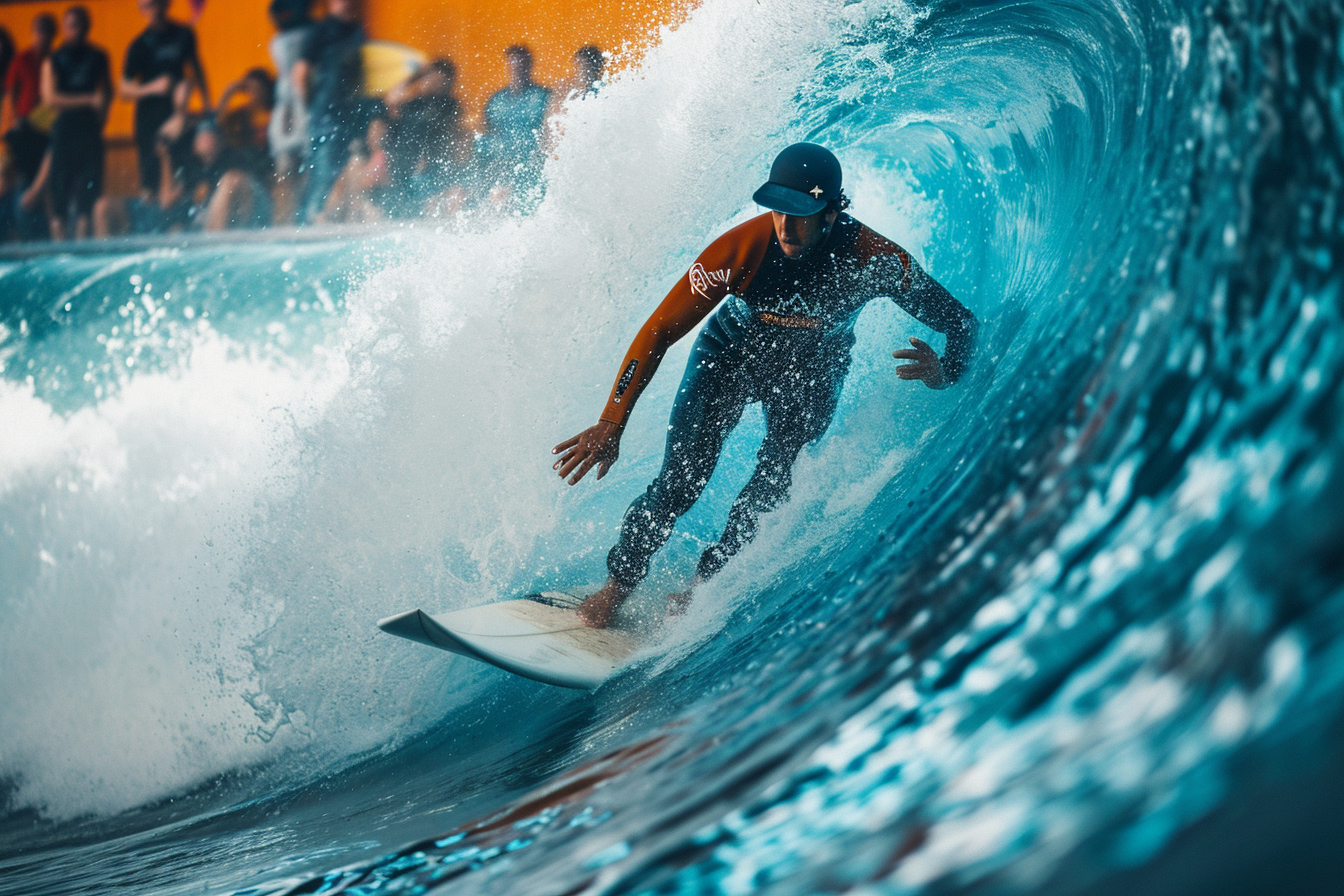
The advent of artificial wave pool technology has revolutionized the sport of surfing, bringing the exhilaration of wave riding to inland locations and providing a consistent platform for surfers of all levels to practice and compete. Wave pool surfing stands as testament to human ingenuity, allowing people to enjoy the sport without reliance on ocean swells, tides, and weather conditions. This groundbreaking innovation not only democratizes surfing but also provides a controlled environment for high-level competitions.
The technology behind wave pools
Wave pools function through an array of different technologies, yet, fundamentally, they are all designed to replicate the ocean’s natural energy in a confined space. Some pools operate by displacing water with paddles or plungers, while others use advanced pneumatic systems or hydrofoils to generate waves. The wave’s shape, size, and power can be adjusted, making these pools suitable for various surfing experiences, from gentle rollers for beginners to barreling waves for professional surfers.
Pioneering facilities and the evolution of design
Prominent facilities, like Kelly Slater’s Surf Ranch in California and Wavegarden installations in multiple countries, integrate complex engineering to produce remarkably consistent waves. Over time, the design of these wave pools has progressively evolved to deliver waves with a more genuine ocean-like feel, allowing surfers to execute a full repertoire of maneuvers.
Surf competition in wave pools
Advantages of wave pools for surfing competitions
Wave pools offer several advantages for surf competitions. Foremost, organizers can schedule events without the unpredictability of surf conditions, ensuring a level playing field where athlete performance is the primary competitive variable. Wave pool technology facilitates the precise replication of waves for each competitor, which eliminates natural variability and focuses on the athletes’ skills and creativity.
Judging and Scoring
In wave pool surf competitions, the clarity of scoring and judging is enhanced due to the controlled conditions. Judges can evaluate performance without the added complexity of changing wave sets, focusing on the surfers’ techniques, style, and innovation.
The competitive format
Competitions in wave pools can adopt various formats, from standard heat-based events to head-to-head matchups where surfers take turns on identical waves. This allows for clear comparisons between athletes and a greater emphasis on strategy within the sport.
Training ground for surfers
Accessibility and consistency
For surfers, wave pools represent invaluable training ground due to their accessibility and the consistency of waves. Athletes can repeatedly practice maneuvers on a nearly identical wave, allowing them to refine their skills in a way that is simply not possible in the ocean.
Inclusivity and reach
The location of wave pools expands the reach of surfing, allowing those far from coastlines to engage in the sport. This inclusivity has propelled the growth of a global surfing community and unearthed talents from regions previously unable to participate.
The implications of wave pool surfing on traditional surfing

Cultural impact
Traditional surfing culture has been shaped by the unpredictability and respect for the ocean. Wave pools introduce a different dynamic, one where the ocean’s unpredictability and connection are not inherent in the experience. The cultural implications of this shift are complex and nuanced, raising discussions about the essence of surfing and its future direction.
Environmental considerations
While wave pools offer many benefits, they also carry environmental considerations. The construction and operation of wave pools require significant energy and resources. Proponents of sustainable surfing practices scrutinize the impact of these facilities on water usage and energy consumption.
Future of wave pool surf competitions
Technological innovations
As wave pool technology advances, the potential for more diverse and challenging wave configurations increases. Innovations might include creating waves that mimic famous surfing spots or designing entirely new wave types that push the boundaries of the sport.
Inclusion in major sporting events
The predictability and spectator-friendly nature of wave pool competitions make them ideal for inclusion in major sporting events, like the Olympics. The success of surfing’s inclusion in the Tokyo 2020 Games, held in the ocean, paves the way for future events in wave pools.
Strategies for hosting successful wave pool surf competitions
Infrastructure and experience
Successful wave pool competitions depend not only on the wave technology but also on the infrastructure surrounding the pool. Adequate facilities for competitors, spectators, and media are vital. Furthermore, creating a festival-like atmosphere with vendors, entertainment, and interactive experiences can enhance the event.
Broadcast and media coverage
Wave pools provide unique opportunities for media coverage, with camera angles and broadcast options that aren’t feasible in the ocean. These advantages can be leveraged to attract a broader audience and elevate surfing’s profile as a spectator sport.
Engagement with the surfing community
Engaging the broader surfing community is essential for the success of wave pool competitions. Balancing the traditional aspects of surfing culture with the innovative nature of wave pool events can foster a supportive and enthusiastic atmosphere.
Challenges and criticisms
Addressing the purists
A segment of the surfing community, often referred to as purists, criticizes artificial wave pools for lacking the soul and spirit of ocean surfing. Competition organizers and wave pool proprietors must address these criticisms by ensuring their events honor the traditions and ethos of surfing, even in an artificial setting.
Economic accessibility
Despite the benefits of wave pool surfing, the cost of entry can be a barrier, making it less economically accessible than ocean surfing. Initiatives to include a wider socioeconomic demographic are important for the inclusive growth of the sport.
Regulatory hurdles
Developing and operating a wave pool requires navigating a complex web of regulations and permits. Environmental impact assessments and local zoning laws can pose significant challenges to new wave pool projects.
Wave pool surfing competitions are shaping the future of surfing, offering a controlled, spectator-friendly, and globally accessible platform for the sport. As technology advances and wave pools become more commonplace, the potential for growth in competitive surfing is immense. While the challenges and criticisms must be acknowledged and addressed, the benefits provided by wave pool surfing herald an exciting evolution within the sport, ensuring its continued popularity and development far from the shores of the traditional surfing realm.
As we witness this transformation, it’s clear that the essence of surfing— the connection between surfer and wave—remains the central focal point, irrespective of the waves’ origin. Whether forged by nature or human invention, the thrill of the ride endures, and with it, the ever-expanding world of surf culture continues to flourish.

